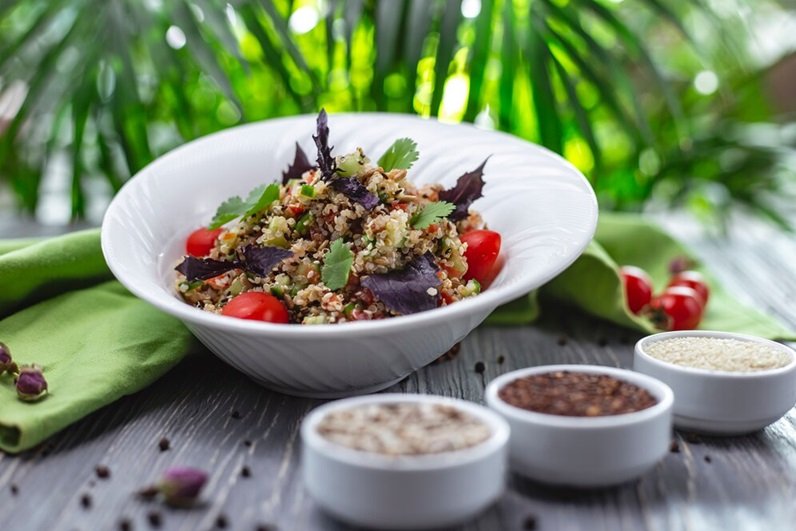Quinoa, a nutrient-rich superfood, has been gaining popularity worldwide for its versatility, health benefits, and delicious taste. Whether you are a health-conscious individual, a fitness enthusiast, or just someone looking to add a nutritious grain to your diet, quinoa should definitely be on your radar. In this article, we will explore the top 7 reasons why you should eat quinoa and how it can positively impact your health.
7 Reasons Why You Should Eat Quinoa
1. Rich in Protein and Essential Amino Acids
One of the most remarkable benefits of quinoa is its high protein content. Unlike most grains, quinoa is considered a complete protein, meaning it contains all nine essential amino acids that our bodies cannot produce on their own. This makes it an excellent protein source for vegetarians, vegans, and anyone looking to increase their protein intake without consuming animal products.
In particular, quinoa is a fantastic choice for those looking to build muscle or recover from intense physical activity. The presence of lysine—an amino acid that plays a crucial role in muscle repair—makes quinoa ideal for athletes and active individuals. Quinoa can also help maintain muscle mass and promote overall body strength.
2. High in Fiber for Digestive Health
Quinoa is loaded with dietary fiber, which is essential for maintaining a healthy digestive system. Fiber promotes regular bowel movements, reduces constipation, and may even prevent certain digestive disorders, such as irritable bowel syndrome (IBS). One cup of cooked quinoa contains approximately 5 grams of fiber, making it a fantastic choice for anyone looking to boost their fiber intake.
Consuming high-fiber foods like quinoa also contributes to weight management. Fiber creates a feeling of fullness, helping to reduce overeating and unnecessary snacking throughout the day. Additionally, fiber can stabilize blood sugar levels, making quinoa a great option for individuals with type 2 diabetes or those at risk of developing it.
3. Packed with Vitamins and Minerals
Quinoa is an excellent source of essential vitamins and minerals that support overall health and well-being. Some of the key nutrients found in quinoa include:
- Magnesium: Supports muscle function, reduces inflammation, and helps regulate blood pressure.
- Iron: Vital for oxygen transportation in the blood and preventing anemia.
- B-vitamins (B1, B2, B6, and folate): Essential for energy production, brain health, and reducing the risk of birth defects.
- Potassium: Helps balance electrolytes and aids in heart health.
- Zinc: Supports immune function, cell growth, and wound healing.
Incorporating quinoa into your diet can help fill any nutrient gaps, ensuring that you are getting a broad spectrum of vitamins and minerals that contribute to overall health.
4. Gluten-Free and Suitable for Those with Celiac Disease
For individuals with celiac disease or gluten sensitivity, finding nutritious and safe grains can be challenging. Fortunately, quinoa is naturally gluten-free and provides a safe alternative to traditional gluten-containing grains such as wheat, barley, and rye.
Not only is quinoa gluten-free, but it is also nutrient-dense, making it a superior choice to many gluten-free processed foods that are often low in nutritional value. By incorporating quinoa into your gluten-free diet, you can enjoy the benefits of a whole grain without the risk of triggering adverse reactions.
5. Antioxidant-Rich to Combat Inflammation
Quinoa is rich in antioxidants, which play a crucial role in protecting the body from oxidative stress and inflammation. One of the most powerful antioxidants found in quinoa is quercetin, which has been shown to have anti-inflammatory, antiviral, and anticancer properties.
Regular consumption of antioxidant-rich foods like quinoa can help reduce the risk of chronic diseases such as heart disease, cancer, and neurodegenerative conditions. Antioxidants neutralize free radicals in the body, which are unstable molecules that can damage cells and contribute to aging and disease.
6. Supports Heart Health
Eating quinoa regularly can have a positive impact on your cardiovascular health. Quinoa contains a variety of heart-healthy nutrients, including fiber, magnesium, potassium, and antioxidants, all of which work together to promote heart health.
Fiber helps lower LDL cholesterol (the “bad” cholesterol) levels in the blood, reducing the risk of heart disease. Magnesium plays a role in regulating blood pressure, while potassium helps balance sodium levels and maintain a healthy blood pressure range. Antioxidants protect the heart by preventing oxidative damage to blood vessels.
Additionally, the presence of healthy fats, such as omega-3 fatty acids, in quinoa contributes to overall heart function and helps reduce inflammation in the cardiovascular system.
7. Versatile and Easy to Incorporate into Any Diet
One of the most appealing aspects of quinoa is its culinary versatility. Quinoa has a mild, nutty flavor and a fluffy texture, making it a perfect addition to a variety of dishes. Whether you’re looking for a savory side dish, a protein-packed salad, or a hearty breakfast bowl, quinoa can easily be incorporated into your meals.
Here are a few ways to enjoy quinoa:
- Salads: Add cooked quinoa to your salads for a nutritious boost of protein and fiber.
- Soups and Stews: Use quinoa as a gluten-free alternative to pasta or rice in soups and stews.
- Breakfast Bowls: Combine quinoa with fruit, nuts, and yogurt for a nutrient-dense breakfast.
- Stir-Fries: Mix quinoa with vegetables, lean proteins, and sauces for a quick and healthy dinner.
Quinoa is also available in various forms, including quinoa flour, quinoa flakes, and puffed quinoa, making it even easier to incorporate into your cooking and baking.
Conclusion
In summary, quinoa is a powerhouse grain that offers numerous health benefits. From its high protein and fiber content to its rich array of vitamins, minerals, and antioxidants, quinoa is a valuable addition to any diet. It is especially beneficial for those seeking plant-based protein sources, individuals with gluten sensitivities, and anyone looking to support their overall health.
By making quinoa a staple in your meals, you can enjoy improved digestive health, enhanced muscle recovery, better heart function, and a stronger immune system. The versatility of quinoa ensures that you can easily incorporate it into your daily routine while reaping its many nutritional benefits.
Read Also this one: What Are 7 Reasons Why Biodiversity Is Important



